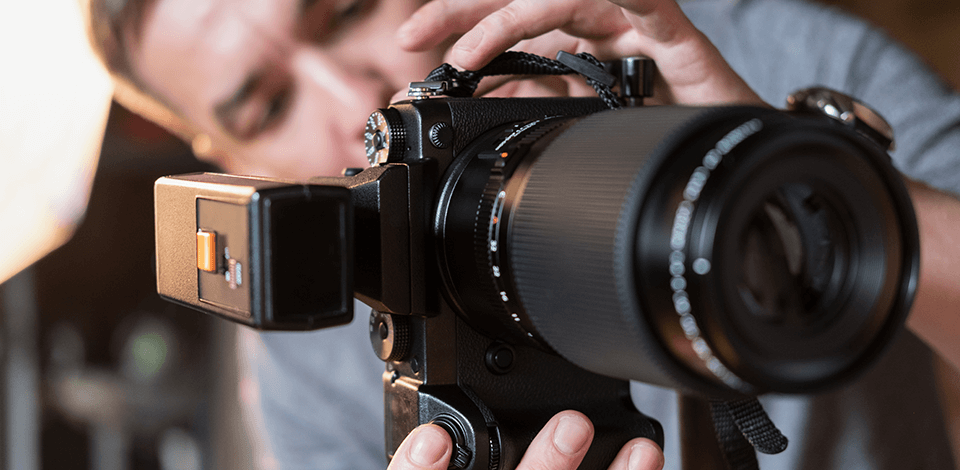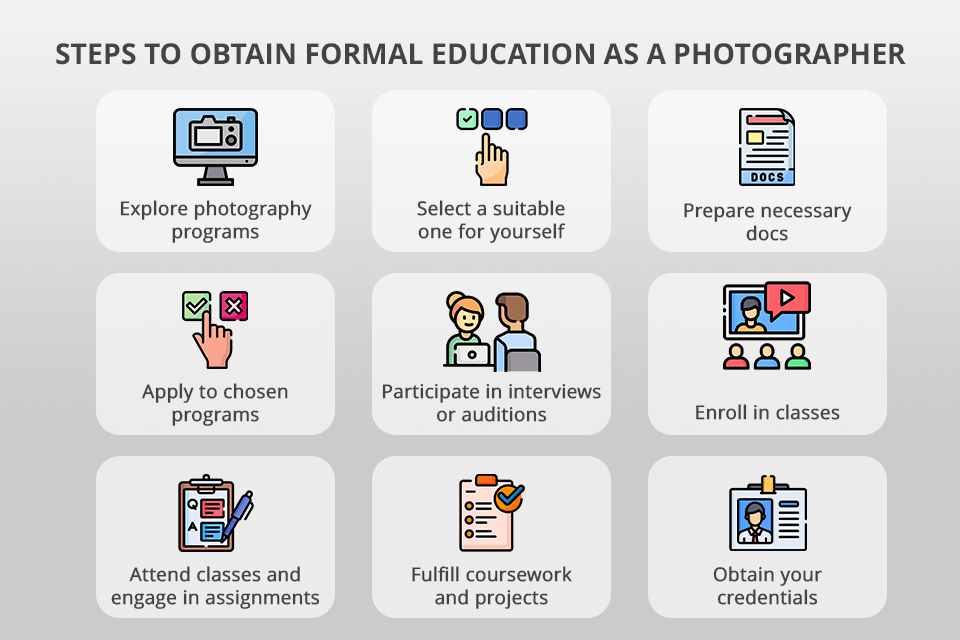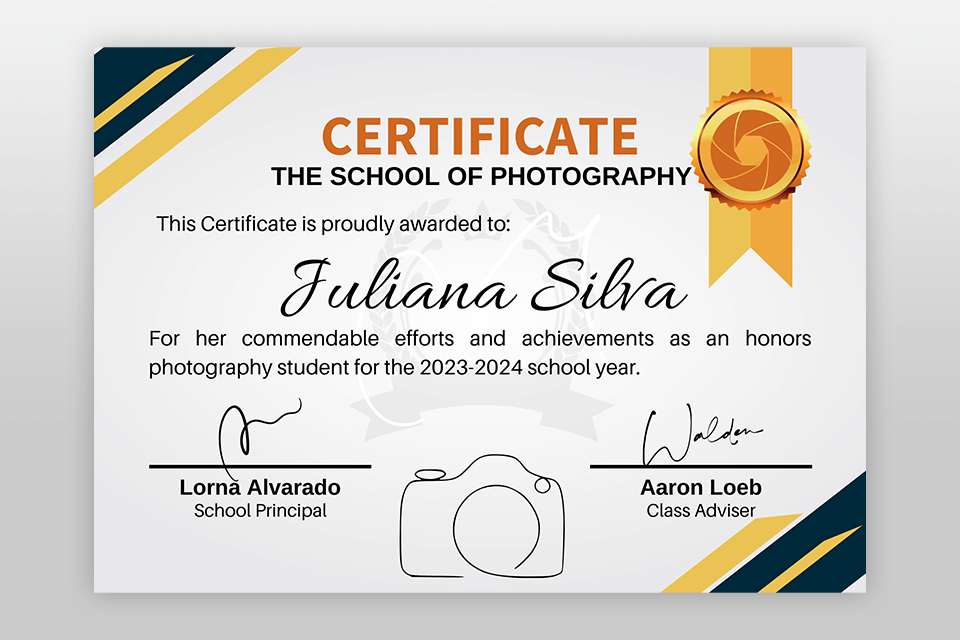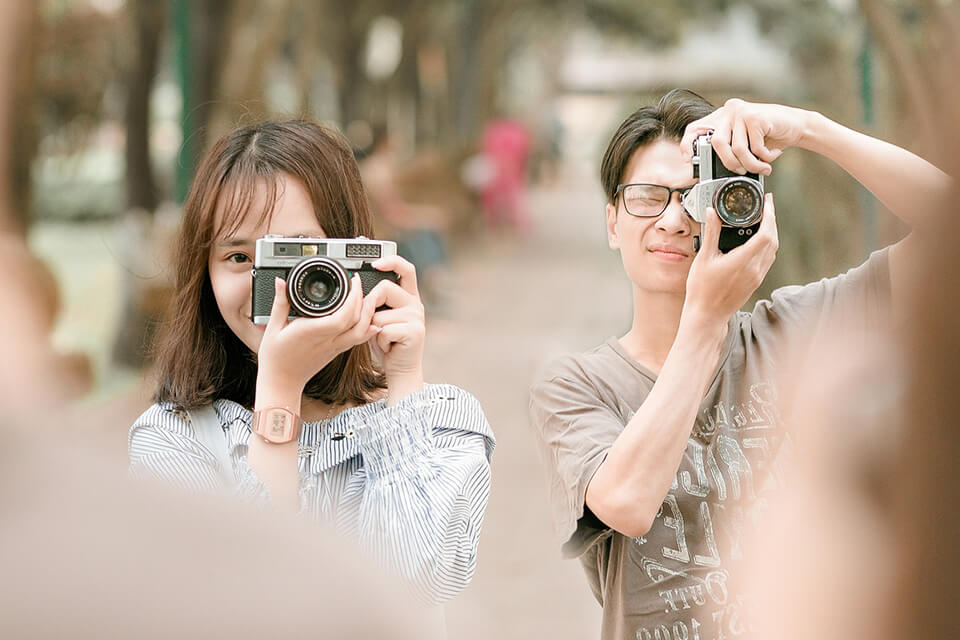
Speaking about the photographer education requirements, studying in special institutions is not actually a necessity. However, specialized courses will enable you to learn this craft in a more structured way under a mentorship. Besides, a diploma or a certificate is a sure way to get credibility among clients.
No matter what degree you are going to receive (associate's or master's levels), you’ll get technical skills, discover artistic principles, and get the ability to try the acquired knowledge in practice.
Besides, a student will have to complete coursework on one of the following topics: camera operation, lighting techniques, composition, digital imaging, and editing software.

The most common way to get a formal education in photography is to study at photography schools that offer programs specifically designed for novice shooters. However, with the rise of online education, people benefit from the ability to study at special digital platforms and online learning resources, so aspiring shooters now have more opportunities to acquire special skills and knowledge.
|
Admission Requirements |
Portfolio, recommendations, proficiency demo, statement of purpose |
|
Online Learning |
Flexible courses, interactive elements, networking |
|
Self-Directed Learning |
Experimentation, projects, resources |
|
Possible Careers |
Art director, gallery assistant, photojournalist, photo archivist, photo editor, photo researcher, photo technician, teacher |
|
Education Cost |
Ranges from $5,000 to $40,000 per year for tuition and fees |
|
Photographers’ Salary |
Varies widely; $20,000 to $100,000+ per year |
Before becoming a professional photographer, many shooters got higher education in this field.
For example, Andreas Gursky specializes in capturing landscapes and architecture producing scalable and digitally manipulated pics. All the necessary knowledge he got at the Kunstakademie Düsseldorf.
Cindy Sherman is a famous conceptual portrait photographer. She studied this art at the State University of New York at Buffalo and now she is considered as one of the most popular contemporary shooters.
Margaret Bourke-White is a reputable photojournalist who is known for her symbolic and heartbreaking World War II photos that appeared in Life magazine. She attended the Clarence H. White School of Photography in New York City.
Associate's Degree. Associate's degree programs in photography usually last for two years. During this time you can learn more about photography techniques, composition, and digital imaging.
One of the most decent institutions in this category is the "Associate of Applied Science in Photography" at the New York Film Academy.
Bachelor's Degree. The duration of a Bachelor's degree program is four years. Students get comprehensive knowledge about photography technology, artistic principles, and professional practices.
Turn your attention to "Bachelor of Fine Arts in Photography" at the School of Visual Arts (SVA) in New York City.
Master's Degree. If you are serious about learning photography art in the most comprehensive way, register for one of the Master's degree programs. Advanced coursework, research opportunities, and specialized training in one of the fields including fine art photography, documentary photography, or commercial photography are what you can get after graduation.
My recommendation is "Master of Fine Arts in Photography" at Savannah College of Art and Design (SCAD).
These programs provide specialized training for those who want to become professionals in specific areas like portrait shooting, photojournalism, or digital imaging. Usually, they do not span a long period of time and offer practical skills for entry-level positions in the industry.

What time do you need to study to become a pro-level photographer? When learning at the community colleges, a student can get a photography license and a certificate within a year.
An outstanding example is the "Professional Photography Certificate Program" at Santa Monica College in California.
Online education can satisfy education and training requirements for a photographer of any level of proficiency, as it offers extreme flexibility for mastering the craft. There are many worthy e-learning platforms like Coursera, Udemy, and LinkedIn. They offer a vast variety of free online photography courses on various topics including camera techniques, lighting, composition, and post-processing.
Turn your attention to such options as "Photography Masterclass: A Complete Guide to Photography" on Udemy, "The Art of Photography" on Coursera, "Photoshop for Photographers" on LinkedIn Learning.
Not rarely, do photographers decide to learn or improve their photography craft on their own. For this purpose, they experiment, practice, and visit online resources. Self-directed students read books, watch tutorials, visit online forums, and work on personal projects to enhance their skills and develop their own artistic style on their schedule.
Among the most useful resources are such books as "Understanding Exposure" by Bryan Peterson, and tutorials on websites like YouTube and Lynda.
Photography workshops are the best solution for specialists who want to master specific areas of photography like portrait or/and landscape photos, or studio lighting in a short time. These programs do not last long and the tutors are usually seasoned photographers who provide opportunities for networking and collaboration.
"Portrait Photography Workshop" by Annie Leibovitz or "Landscape Photography Seminar" by National Geographic will be the best variants.
The major plus of such programs is that the students get the necessary experience, mentorship, and feedback from established photographers. They provide a precious ability to discover the peculiarities of this job in real-world settings. Besides, this is a great opportunity to get valuable industry insights from experts.
If the option to become an apprentice under the guidance of a seasoned professional seems appealing to you, consider applying to such associations as Professional Photographers of America (PPA).

Although formal education is not required to become a photographer, this kind of training provides multiple benefits to novice photographers enabling them to enhance their skills, climb the career ladder, and get everything they want in the field.
Technical proficiency. Photography programs provide students with an opportunity to become experts in camera operation, lighting techniques, composition, and post-processing in a more structured way. This foundation gives students the required knowledge and expertise to produce pics of top quality.
Artistic development. Photographers who get formal education usually become experts in the field quicker as they are encouraged to experiment, tinker with visual concepts, and think critically. For students, it is easier to develop their personal style and come up with creative ideas.
Mentorship and feedback. The opportunity to communicate with experienced faculty members and peers is a sure way to get the necessary guidance, assistance, and constructive feedback. Under a mentorship, it is easier to deal with challenges and discover the rules of the photography industry.
Portfolio building. Another advantage of getting a formal education is the ability to build a professional portfolio with the best works. This is a collection of the most impressive and successful photos compiled to demonstrate a photographer’s level of professionalism. With its help, it is easier to attract clients, advance your career level, and secure internships.
Networking opportunities. Regular communication with fellow students and teachers is a great plus as well. Networking allows beginner photographers to establish connections, collaborate with other aspiring photographers, be always aware of industry trends, etc.
Industry credentials. Completing photography courses like visiting wedding photography classes makes a specialist more competitive on the market. A certificate or diploma is often among professional photographer education requirements, and, as practice shows, employers and clients cooperate with such a specialist more willingly.
Although formal education is not a necessity, getting a photography degree is one of the most reliable ways to gain valuable skills and knowledge. However, many reputable photographers are self-taught, while others get the necessary training through workshops and photo courses in London and other cities.
These degrees range from associate's to master's levels. But if you also studied fine arts, visual arts, or communications, it will be a considerable advantage.
It depends on the institution but most frequently a portfolio, letters of recommendation, and knowledge of basic photography techniques are required.
You can learn all types of photography from the comfort of your home. The online courses provide flexibility and a sort of freedom to study on your own schedule.
Proficiency in camera handling, understanding the principles of light and composition, strong creativity, attention to detail, and knowledge of basic editing techniques are among the education and training requirements for a photographer.
Without practical experience, it is not possible to polish your skills and build a portfolio. To try your knowledge in practice, you should become an apprentice, an assistant to an experienced photographer, work on personal projects, etc.
Portrait, landscape, commercial, documentary, fashion, or wildlife photography are the most popular photography genres. Specializing in one of them allows focusing your skills and develop a niche.
Continuous learning is a must for every shooter. To keep abreast with the most recent trends, attend workshops, seminars, and exhibitions, communicate with other photographers, and read specialized publications, etc.